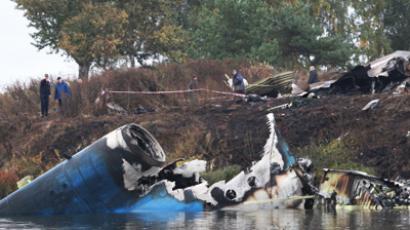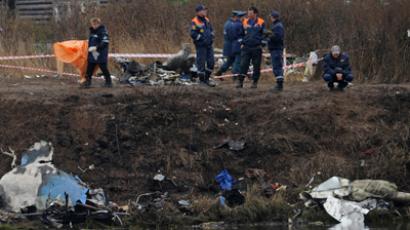Hockey plane crash: Drugs and bad braking
The probe into September’s crash near Yaroslavl, which killed an entire hockey team and most crew members, found illegal drugs in the co-pilot’s blood, and irregularities in the airline company’s pilot training program.
The report of the Interstate Aviation Committee (IAC) published on Wednesday says the immediate cause of the crash was incorrect breaking, which prevented the Yakovlev Yak-42 from taking off properly.The investigation could not however establish who was behind the fatal ill-judged use of the plane’s controls. It could have been the captain or the co-pilot, as the pedal positions are not fed to a Yak-42’s flight recorders, the report said. Both crew members had previously flown a Yak-40, which has a different pedal construction, thus resulting in a “negative transfer of skills”, says Aleksey Morozov, who chaired the technical commission, which investigated the case.“Erroneous pressing of the braking pedals by the crew during take-off is only possible if a pilot’s feet are placed wrongly. An action, which is small in terms of force applied and movement of the pedal, may not be noticed by the pilot,” he explained.It seems the crew could have averted the crash, but lacked the coordination to do so.“Had the crew evaluated the situation and decided to stop the take-off instead of switching to take-off mode… it would have prevented the incident,” Morozov explained.The report says both captain and co-pilot were experienced aviators, but neither had enough practice piloting a Yak-42. It also blames the airline Yak-Service, which owned the aircraft, for not training the crew properly before entrusting them with an unfamiliar vehicle.“The captain of the vehicle didn’t receive the full piloting course for a Yak-42, just the theoretical part. The simulator training was treated as a pure formality and done irregularly, so proper piloting skills couldn’t build up,” the commission chair said, adding that the company didn’t organize quality control of the training.Investigators also found traces of the sedative Phenobarbital in the blood of the co-pilot. A crew member is not allowed to take control of an aircraft after taking this drug, Morozov stressed. The co-pilot had reported health problems, including partial loss of sensation in the legs and poor coordination, his medical records showed.Meanwhile, the technical condition of the plane was deemed good, and no evidence has been found that the crash may have been due to hardware failure.The probe also ruled out the possibility that the crew had acted under pressure from traffic control to depart faster. This version of events was voiced by some media, which said the airport operated under great stress due to an international summit in Yaroslavl, and the high number of flights on the day of the crash.The committee however lashed out at the airport management, stressing it had a license to accept only international cargo flights – not passenger ones.The Yakovlev Yak-42 carrying the Yaroslavl ice hockey team Lokomotiv to a game in Belarus crashed on September 7. Of the 45 people onboard 43 were killed on the spot, and one player died later in hospital. The only survivor is flight engineer Aleksandr Sizov.The airline’s license was revoked in late September. A criminal investigation to establish the parties responsible is underway.














